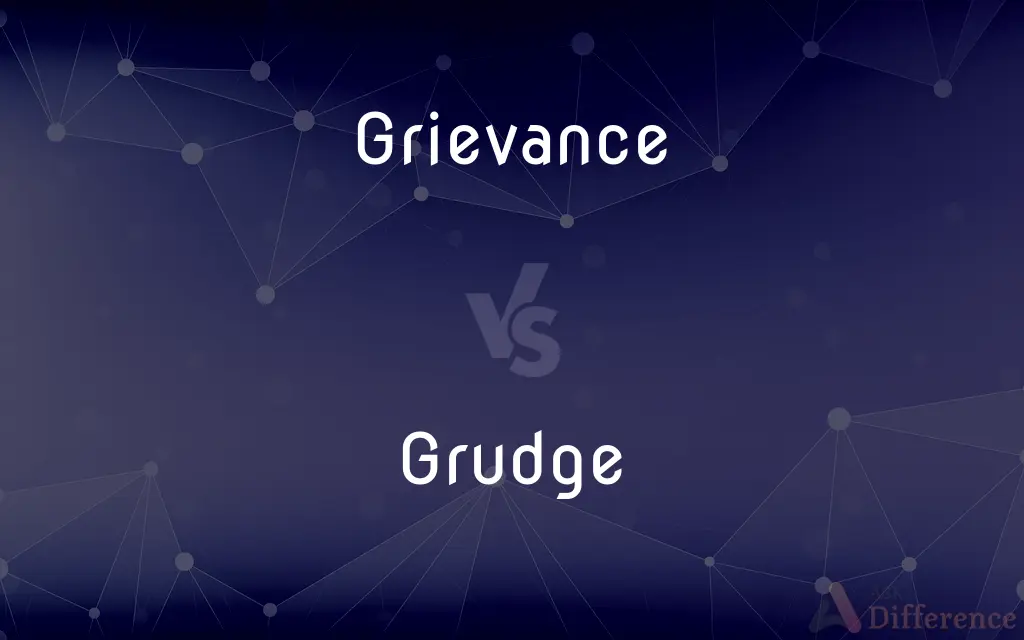Grievance vs. Grudge — What's the Difference?
By Urooj Arif & Fiza Rafique — Updated on May 8, 2024
Grievances are formal complaints, typically work-related, and addressed through official channels, while grudges are personal, sustained feelings of resentment held against someone.

Difference Between Grievance and Grudge
Table of Contents
ADVERTISEMENT
Key Differences
A grievance is an official complaint that can arise in settings like workplaces or institutions, often due to perceived unfair treatment. Whereas, a grudge is a personal, emotional response characterized by lingering resentment towards another individual for past slights or conflicts.
Grievances typically follow a formal process for resolution, involving documentation and a series of steps laid out by organizational policies. On the other hand, a grudge is maintained privately and lacks a formal procedure for resolution.
The intention behind filing a grievance is usually to seek redress or correction of a wrong, aiming for a tangible change or outcome. In contrast, holding a grudge does not necessarily involve seeking a resolution; it is more about harboring ill feelings.
Grievances are often temporary and resolve once the issue is addressed through the appropriate channels. Grudges, however, can be long-lasting and may persist even in the absence of ongoing issues.
While grievances can be voiced and dealt with openly in a structured environment, grudges are usually not expressed in a formal setting and are handled personally, often without direct confrontation.
ADVERTISEMENT
Comparison Chart
Nature
Formal complaint
Personal resentment
Context
Workplaces, institutions
Personal relationships
Process
Follows official protocols
Informal, no set protocols
Resolution
Seeks to address and correct
No formal resolution sought
Duration
Often temporary
Can be long-lasting
Compare with Definitions
Grievance
An official statement of a complaint over something believed to be wrong or unfair.
The union submitted a grievance to the management.
Grudge
A strong, ongoing feeling of hostility or animosity toward someone.
Holding a grudge can harm one's mental health.
Grievance
A formal complaint about something believed to be wrong or unfair.
He filed a grievance against his employer for unfair dismissal.
Grudge
An instance of bearing ill will against someone for their actions.
The grudge she held seemed to disappear once she talked it over.
Grievance
A feeling of resentment over something believed to be wrong or unfair.
She expressed her grievance over the team's decision.
Grudge
To be resentfully unwilling to give, grant, or allow something.
She grudged him the opportunity to explain his side of the story.
Grievance
Any circumstance regarded as a cause for complaint.
The new policy on overtime became a grievance among staff.
Grudge
A persistent feeling of ill will or resentment resulting from a past insult or injury.
He's been holding a grudge against his coworker for years.
Grievance
A wrong considered as grounds for complaint, or something believed to need to be changed or corrected.
A grievance was raised regarding the lack of accessible facilities.
Grudge
A personal and deep-seated dislike for someone based on past interactions.
His grudge against his former coach influenced his decisions.
Grievance
A grievance (from Latin gravis 'heavy') is a wrong or hardship suffered, real or supposed, which forms legitimate grounds of complaint. In the past, the word meant the infliction or cause of hardship.
Grudge
To be reluctant to give or admit
Even grudged the tuition money.
Grievance
An actual or supposed circumstance regarded as just cause for complaint.
Grudge
To resent for having; begrudge
Grudged him his good ways with the children.
Grievance
A complaint or protestation based on such a circumstance
The warden addressed the inmates' grievances.
Grudge
A deep-seated feeling of resentment or rancor
Bears a grudge about the accident.
Grievance
Indignation or resentment stemming from a feeling of having been wronged.
Grudge
(countable) Deep-seated and/or long-term animosity or ill will about something or someone, especially due to a past misdeed or mistreatment.
To have, hold, or bear a grudge against someone
Grievance
The act of inflicting hardship or harm.
Grudge
To be unwilling to give or allow (someone something).
Grievance
The cause of hardship or harm.
Grudge
(obsolete) To grumble, complain; to be dissatisfied.
Grievance
(countable) Something which causes grief.
Grudge
(obsolete) To hold or harbour with malicious disposition or purpose; to cherish enviously.
Grievance
(countable) A wrong or hardship suffered, which is the grounds of a complaint.
Grudge
To look upon with desire to possess or to appropriate; to envy (one) the possession of; to begrudge; to covet; to give with reluctance; to desire to get back again; - followed by the direct object only, or by both the direct and indirect objects.
Tis not in thee To grudge my pleasures, to cut off my train.
I have often heard the Presbyterians say, they did not grudge us our employments.
They have grudged us contribution.
Grievance
(uncountable) Feelings of being wronged; outrage.
Grudge
To hold or harbor with malicious disposition or purpose; to cherish enviously.
Perish theyThat grudge one thought against your majesty !
Grievance
(countable) A complaint or annoyance.
Grudge
To be covetous or envious; to show discontent; to murmur; to complain; to repine; to be unwilling or reluctant.
Grudge not one against another.
He eats his meat without grudging.
Grievance
(countable) A formal complaint, especially in the context of a unionized workplace.
If you want the problem fixed, you'll have to file a grievance with the city.
Grudge
To feel compunction or grief.
Grievance
(uncountable) Violation of regulations or objectionable behavior.
Grudge
Sullen malice or malevolence; cherished malice, enmity, or dislike; ill will; an old cause of hatred or quarrel.
Esau had conceived a mortal grudge and enmity against his brother Jacob.
The feeling may not be envy; it may not be imbittered by a grudge.
Grievance
A cause of uneasiness and complaint; a wrong done and suffered; that which gives ground for remonstrance or resistance, as arising from injustice, tyranny, etc.; injury.
Grudge
Slight symptom of disease.
Our shaken monarchy, that now lies . . . struggling against the grudges of more dreaded calamities.
Grievance
Grieving; grief; affliction.
The . . . grievance of a mind unreasonably yoked.
Grudge
A resentment strong enough to justify retaliation;
Holding a grudge
Settling a score
Grievance
A resentment strong enough to justify retaliation;
Holding a grudge
Settling a score
Grudge
Bear a grudge; harbor ill feelings
Grievance
An allegation that something imposes an illegal obligation or denies some legal right or causes injustice
Grudge
Accept or admit unwillingly
Grievance
A complaint about a (real or imaginary) wrong that causes resentment and is grounds for action
Common Curiosities
What is a grievance?
A grievance is a formal complaint regarding something believed to be wrong or unfair, typically within a workplace or institution.
What is a grudge?
A grudge is a sustained feeling of resentment or ill will towards someone due to past slights or injuries.
How can someone let go of a grudge?
Letting go of a grudge may involve personal reflection, forgiveness, and sometimes counseling or therapy.
How is a grievance resolved?
A grievance is resolved through a formal process, which may involve mediation, arbitration, or adherence to specific organizational procedures.
How long can a grudge last?
A grudge can last indefinitely, often persisting until the individual decides to let go of the resentment.
Can a grievance lead to a grudge?
Yes, if a grievance is handled poorly or left unresolved, it can lead to the development of a grudge.
Is it necessary to express a grudge?
While not necessary, expressing the feelings associated with a grudge can sometimes help in resolving the underlying issues.
Are grudges healthy?
Holding grudges is generally considered unhealthy as it can lead to prolonged stress, anxiety, and damaged relationships.
Can anyone file a grievance?
Yes, anyone who feels they have been wronged in a formal setting like a workplace or institution can file a grievance.
What triggers a grudge?
A grudge is often triggered by a real or perceived injustice, personal betrayal, or harm.
Can grudges affect physical health?
Yes, long-term resentment and stress associated with grudges can lead to various physical health issues, including increased risk of heart disease and weakened immune system.
What is the difference between a grievance and a complaint?
A grievance is more formal and is often related to workplace or institutional policies, while a complaint can be more general and informal.
What are the benefits of resolving a grievance?
Resolving grievances can improve workplace morale, restore fairness, and prevent similar issues in the future.
What are the effects of holding a grudge?
Holding a grudge can affect mental and emotional well-being, leading to bitterness and an inability to enjoy present relationships and experiences.
How does one address a grievance in the workplace?
Addressing a grievance in the workplace usually involves following the grievance procedure outlined in the employment contract or the company’s HR policies.
Share Your Discovery

Previous Comparison
Monoses vs. Nonoses
Next Comparison
Cut vs. NickedAuthor Spotlight
Written by
Urooj ArifUrooj is a skilled content writer at Ask Difference, known for her exceptional ability to simplify complex topics into engaging and informative content. With a passion for research and a flair for clear, concise writing, she consistently delivers articles that resonate with our diverse audience.
Co-written by
Fiza RafiqueFiza Rafique is a skilled content writer at AskDifference.com, where she meticulously refines and enhances written pieces. Drawing from her vast editorial expertise, Fiza ensures clarity, accuracy, and precision in every article. Passionate about language, she continually seeks to elevate the quality of content for readers worldwide.
















































